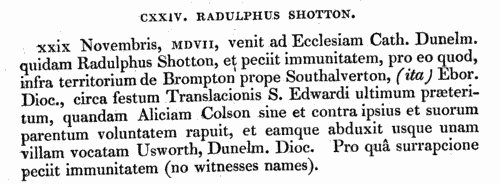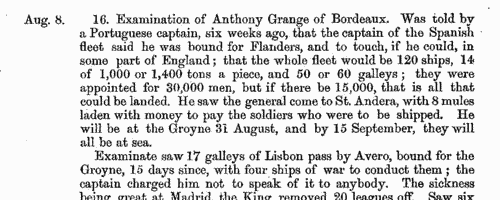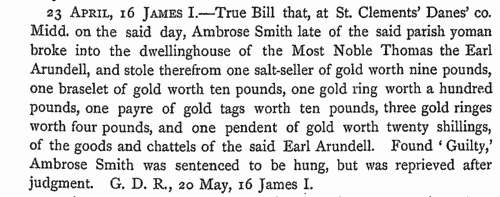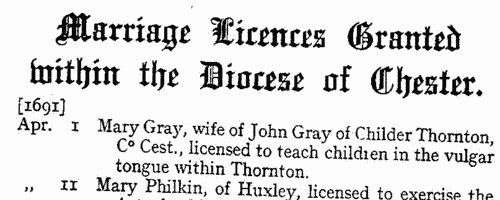Ewbank Surname Ancestry ResultsOur indexes 1000-1999 include entries for the spelling 'ewbank'. In the period you have requested, we have the following 225 records (displaying 1 to 10): Single Surname Subscription | | | Buying all 225 results of this search individually would cost £1,290.00. But you can have free access to all 225 records for a year, to view, to save and print, for £100. Save £1,190.00. More... |
These sample scans are from the original record. You will get scans of the full pages or articles where the surname you searched for has been found. Your web browser may prevent the sample windows from opening; in this case please change your browser settings to allow pop-up windows from this site. Murderers sheltering in Durham Cathedral: and their victims
(1464-1524)
Criminals could evade pursuit by claiming sanctuary in Durham Cathedral. Persons who took refuge fled to the north door of the cathedral, and knocked for admission. There were two chambers over the door in which men slept, for the purpose of admitting fugitives at any hour of the night. As soon as anyone was so admitted, the Galilee bell was immediately tolled, to give notice that someone had taken sanctuary. The offender was required to declare before witnesses the nature of his offence, and to toll a bell in token of his demanding the privilege of sanctuary. He was then provided with a gown of black cloth with a yellow cross, called St Cuthbert's Cross, upon the left shoulder. A grate was provided near the south door to sleep upon, and for 37 days sufficient provisions and bedding were provided. But within 40 days he had to appear before the coroner, clothed in sackcloth, and be branded on his right hand with the sign of the letter A. This signified that he was swearing to abjure the realm: he was then free to leave the country unhindered. The petitions for immunity were entered in the diocesan registers, usually with the marginal note 'Peticio Immunitatis': those from 18 June 1464 to 10 September 1524 (the privilege was finally abolished in 1624) were edited and printed by the Surtees Society in 1837 under the title Sanctuarium Dunelmense. Some of the criminals came from a considerable distance: the great majority were murderers or homicides. Each entry usually gives full name, original address, (often) trade, a brief description of the crime, often with date, and usually the name of the victim, as well as the witnesses to the petition. This index covers all the surnames given.EWBANK. Cost: £4.00.  | Sample scan, click to enlarge

| Official Papers
(1598-1601)
The State Papers Domestic cover all manner of business relating to Britain, Ireland and the colonies, conducted in the office of the Secretary of State as well as other miscellaneous records.
EWBANK. Cost: £4.00.  | Sample scan, click to enlarge

| Middlesex Sessions
(1603-1625)
Incidents from the Middlesex Sessions Books. These are abstracts of sessional orders, minutes of criminal cases, memoranda and other entries of record taken from the three volumes of Gaol Delivery Register, four volumes of Sessions of Peace Register and two volumes of Process Books of Indictments for the county of Middlesex from the reign of king James I. The references at the end of each item indicate the volume in question, the abbreviations being G. D. for Gaol Delivery, S. P. for Sessions of Peace, and S. O. T. for Session of Oyer and Terminer; occasionally preceded by S. for Special or G. for general, or followed by R. for Roll or Reg. for Register. It should be noted that, in the case of 'true bills' or indictments, the abstract starts with the date on which the offence took place, the date of the conviction &c. being at the end of the entry.EWBANK. Cost: £4.00.  | Sample scan, click to enlarge

| Liegemen and Traitors, Pirates and Spies
(1625-1626)
The Privy Council of Charles I was responsible for internal security in England and Wales, and dealt with all manner of special and urgent matters
EWBANK. Cost: £4.00.  | Sample scan, click to enlarge

| Official Papers
(1656-1657)
The State Papers Domestic cover all manner of business relating to Britain, Ireland and the colonies, conducted by the Council of State, as well as other miscellaneous records. These records are from July 1656 to May 1657.
EWBANK. Cost: £4.00.  | Sample scan, click to enlarge

| Royalist delinquents in county Durham and Northumberland, their successors, tenants, debtors and creditors
(1648-1660)
King Charles I was executed 30 January 1649, the kingship was abolished and government by a Council of State was established 14 February 1649. Oliver Cromwell became Lord Protector 16 December 1653; died 3 September 1658; and was succeeded by his son Richard, who abdicated 24 May 1659. Charles II was established on the throne 29 May 1660. From 1648 to 1660 parliament sequestrated royalists' estates, restoring many by a process of heavy fines called compounding; this was administered by the Committee for Compounding, working through county committees. These raised considerable amounts of money, money which was vitally necessary for maintaining the parliamentary army's campaigns to subdue opposition in the three kingdoms - England, Scotland and Ireland. The raising and delivery of these monies was the responsibility of the Committee for Advance of Money (C. A. M.). The records of these committees were detailed and extensive, amounting to about 300 volumes, and were calendared for the Public Record Office by Mary Anne Everett Green. Abstracts of the county Durham and Northumberland entries were collated by Richard Welford with a manuscript transcript of the proceedings of the parliamentary commissioners in county Durham surviving in Durham cathedral library, and published by the Surtees Society in 1905. The persons named in these abstracts are not only the delinquents themselves, and those who succeeded them in their estates, but tenants, debtors and creditors, and local constables and officials of the committees.EWBANK. Cost: £4.00.  | Sample scan, click to enlarge

| Lancashire and Cheshire Marriage Licences
(1691-1700)
Licences for intended marriages in Chester archdeaconry, which covered Cheshire and Lancashire south of the Ribble (by far the most populous part of that county). As shown in the sample scan, licences to practise midwifery and to teach are also included. The index covers bondsmen as well as brides and grooms.EWBANK. Cost: £4.00.  | Sample scan, click to enlarge

|  Apprentices registered at York
(1710-1712) Apprentices registered at York
(1710-1712)
Apprenticeship indentures and clerks' articles were subject to a 6d or 12d per pound stamp duty: the registers of the payments usually give the master's trade, address, and occupation, and the apprentice's father's name and address, as well as details of the date and length of the apprenticeship. There are central registers for collections of the stamp duty in London, as well as returns from collectors in the provinces. These collectors generally received duty just from their own county, but sometimes from further afield. May 1710 to January 1712. (The sample entry shown on this scan is taken from a Shropshire return)EWBANK. Cost: £8.00.  | Sample scan, click to enlarge

|  Masters of Apprentices registered at Durham
(1710-1712) Masters of Apprentices registered at Durham
(1710-1712)
Apprenticeship indentures and clerks' articles were subject to a 6d or 12d per pound stamp duty: the registers of the payments usually give the master's trade, address, and occupation, and the apprentice's father's name and address, as well as details of the date and length of the apprenticeship. There are central registers for collections of the stamp duty in London, as well as returns from collectors in the provinces. These collectors generally received duty just from their own county, but sometimes from further afield. May 1710 to January 1712. (The sample entry shown on this scan is taken from a Shropshire return)EWBANK. Cost: £8.00.  | Sample scan, click to enlarge

|  Masters of Apprentices registered at York
(1713-1715) Masters of Apprentices registered at York
(1713-1715)
Apprenticeship indentures and clerks' articles were subject to a 6d or 12d per pound stamp duty: the registers of the payments usually give the master's trade, address, and occupation, and the apprentice's father's name and address, as well as details of the date and length of the apprenticeship. There are central registers for collections of the stamp duty in London, as well as returns from collectors in the provinces. These collectors generally received duty just from their own county, but sometimes from further afield. July 1713 to April 1715. (The sample entry shown on this scan is taken from a Norfolk return)EWBANK. Cost: £8.00.  | Sample scan, click to enlarge

|
Research your ancestry, family history, genealogy and one-name study by direct access to original records and archives indexed by surname.
|













